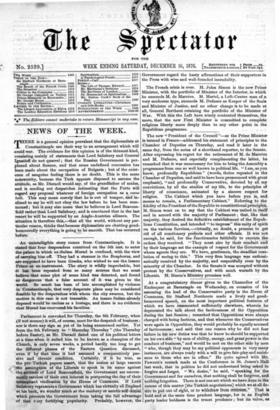The new "President of the Council "—as the Prime Minister
is termed in France—addressed his statement of principles to the Chamber of Deputies on Thursday, and read it later in the same day, from the notes of a shorthand reporter, to the Senate. After expressing his regret for the retirement of M. de Marcere and M. Dufaure, and especially complimenting the latter, he remarked that it was unnecessary for him to bring the Assembly a programme from one so well known in political life. " I am, as you know, profoundly Republican" (words, thrice repeated in the Chamber of Deputies, and said to have been pronounced with great emphasis), "and profoundly Conservative, devoted by all my convictions, by all the studies of my life, to the principles of liberty of conscience, animated by a sincere respect for religion. The Cabinet which you have before you is, and means to remain, a Parliamentary Cabinet." Referring to the fidelity of the President of the Republic to constitutional principles, M. Simon went on to say that the Cabinet was united in itself and in accord with the majority of Parliament ; that, like that majority, they desired the definitive establishment of the Repub- lican Constitution, and intended "to impress" this unity of spirit on the various Services,—virtually, no doubt, a promise to get rid of all reactionary prefects and other officials. It was not enough, he said, for the functionaries faithfully to execute the orders they received. "They must also by their conduct and by their language set the example of respect for the Government whose agents they are. We have, gentlemen, the steadfast reso- lution of seeing to this." This very firm language was enthusi- astically received by the majority, and respectfully even by the minority of the Chamber, in the Senate it was accepted without protest by the Conservatives, and with much warmth by the Liberals. M. Simon's Ministry promises well.


































